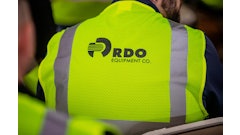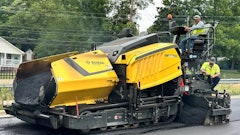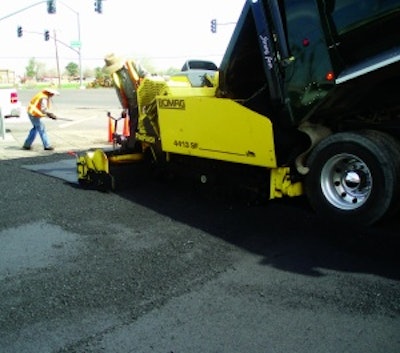
You've been maintaining asphalt drives and parking lots for several years and now are considering doing some paving. Is it as easy as buying a paver and looking for new customers? Probably not say manufacturers that have been producing and marketing pavers for years. This equipment varies dramatically in size, cost, and production capability. Markets differ, customers differ, and so does the competition. Then, before actually pulling the trigger and buying a paver, you need to know if you'll actually have enough work to afford the payments.
"It is important to select the right tool for the job," says Brodie Hutchins, general manager for Vogele America, Inc. "Understand the scope of your paving jobs in terms of paving width and depth. Pavers range in size and price from $50,000-$450,000. Some pavers require three operators and others can be operated by one person.
"Next, determine whether or not wheel or track undercarriage is better for the application. If most of your work would allow transporting the machine from site to site within close proximity chances are a wheel paver can be used. Buying an 8-ft. paver can also reduce your transportation costs versus having a 10-ft. paver which requires an oversize permit. If getting traction would be a challenge in areas with hills and unstable base, a track paver is probably best."
A key concern for contractors is having a paver that is reliable, says George Platt, Dynapac USA vice president of paving and milling. "If a machine breaks down on the job, you lose not only time, you also lose material." He adds that a paver has three fundamental components, a tractor, material feed system, and the screed. A malfunction in any of the three will shut done a job. "Look at ease of maintenance and make sure your dealer has a trained service staff," Platt says. In January, Dynapac introduced a new line of highway class pavers into the United States. "Understand the kind of work you'll be doing," adds Platt. "For most commercial applications a highway class paver would likely be on the big side, and they are less maneuverable. There's also a hefty difference in price between a commercial class paver and a highway paver. Still, if you think you may be doing some highway work in the near future, a larger paver may be a good choice."
John Hood, Bomag Americas sales manager, agrees. "If you have any aspiration of growth, then an entry level paver would not be a good choice. You may not need a highway class paver, but certainly a machine that is conveyor fed will fit your growth needs better than a gravity fed unit. Understand your sweet spot as well as what you may want to do in the future. A little extra production capability, though, would likely pay off in both the long and short runs."
Pavers can be equipped with several options, some of which may not be necessary for first-time operators, depending on the application. Consider, for example, the need for automatic grade and slope. "This option is designed to help paving contractors meet specific standards, usually on highway jobs," Hutchins says. "It is also helpful when matching existing joints. In either instance, it likely wouldn't be an option that first-time pavers need." He says the same holds true for paving extension kits, something more popular in Europe than here, and hopper inserts that are common on large highway jobs.
"Be conservative when it comes to buying options," Hood advises. "Most units come equipped with all you need to get the job done. Options like grade and slope control and depth control are very expensive and, if needed, they can be added later. The rule of thumb is if you're not going to use a feature option more than once a month, don't buy it."
Know Your Market
"Getting into the paving business is a journey," says John Sunkenberg, Volvo product competency manager. "New entrants into the business generally start out very small, paving drives and small parking lots. They eventually may get involved with paving small roads and then one day, possibly, enter the highway market. But the latter requires a sizeable investment in equipment and most paving contractors in the highway market have a ton of experience under their belts."
In other words, he says, a new highway class machine outfitted with the proper options costs in the neighborhood of $400,000, not to mention the support equipment. This expense is not reasonable for most start-up operations. Sunkenberg says he doesn't want to discourage anyone from getting into the larger market, but the expense and experience curve is steep for new paving contractors. The economy, he adds, has also created a degree of uncertainty in both the commercial and highway markets.
"Right now the paving industry is extremely competitive and it may not be possible to enter a mature market," Hutchins says. "The flip side, though, is that since a down economy has put some undercapitalized smaller paving contractors out of business, there could be opportunities for new entrants into the market. Understanding your market, along with the residential and commercial development budgets in your area, will help determine if the time is right to start a paving operation."
Hutchins says that knowing how much demand there will be for your service offering will help determine how much you can spend on a paver. "Also factor in your geographical area and the months that you may not be able to pave," he says. "Lenders typically don't care whether you're working or not. They expect a monthly payment."
He says that "speaking in very broad terms," buying a highway class 8-ft. paver will allow a paving contractor to cover most commercial and highway applications. "They are relatively small and maneuverable and still very productive."
Beginning pavers also need to realize that the paver will not be their only purchase. "You will need a roller and emulsion sprayer, among other tools, to help get the job done," Hutchins says. "Talk to your dealer about rental options for equipment (large pavers are typically not rented). Don't be afraid of buying a used piece of equipment. There are many extended warranty options available to protect your risk."
Know Yourself
Hood reminds paving contractors that since most paver manufacturers make a quality product, the real choice comes down between the size of the unit and support. Like Platt, he emphasizes how important it is to buy from a local servicing dealer, one that will be there to lend a hand when you need it. To help with the buying process, Hood suggests some upfront research. "There is a ton of information on the Internet and attending pavement shows is a good way to network with other contractors and find out what works for them and what doesn't," Hood says. "Research your market, too, including who your competitors are and what types of jobs will be available. Jobs are being bid very low at the moment, but the low prices won't last forever."
Still, he cautions, one of the more important considerations is determining what market segment you plan to service and what future plans may hold. "Most paving contractors don't get into the business to stagnate," Hood says. "No, most everyone wants to grow and doing so in this industry requires having a paver to allow you to take advantage of growth opportunities."
Based in Neenah, WI, Rod Dickens is a freelance writer specializing in the construction industry.

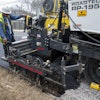


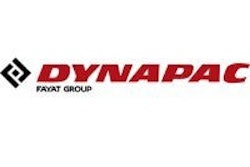
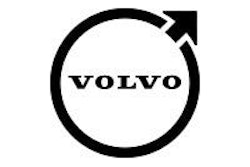
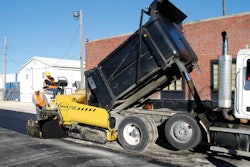





![Lee Boy Facility 2025 17 Use[16]](https://img.forconstructionpros.com/mindful/acbm/workspaces/default/uploads/2025/09/leeboy-facility-2025-17-use16.AbONDzEzbV.jpg?ar=16%3A9&auto=format%2Ccompress&fit=crop&h=135&q=70&w=240)



